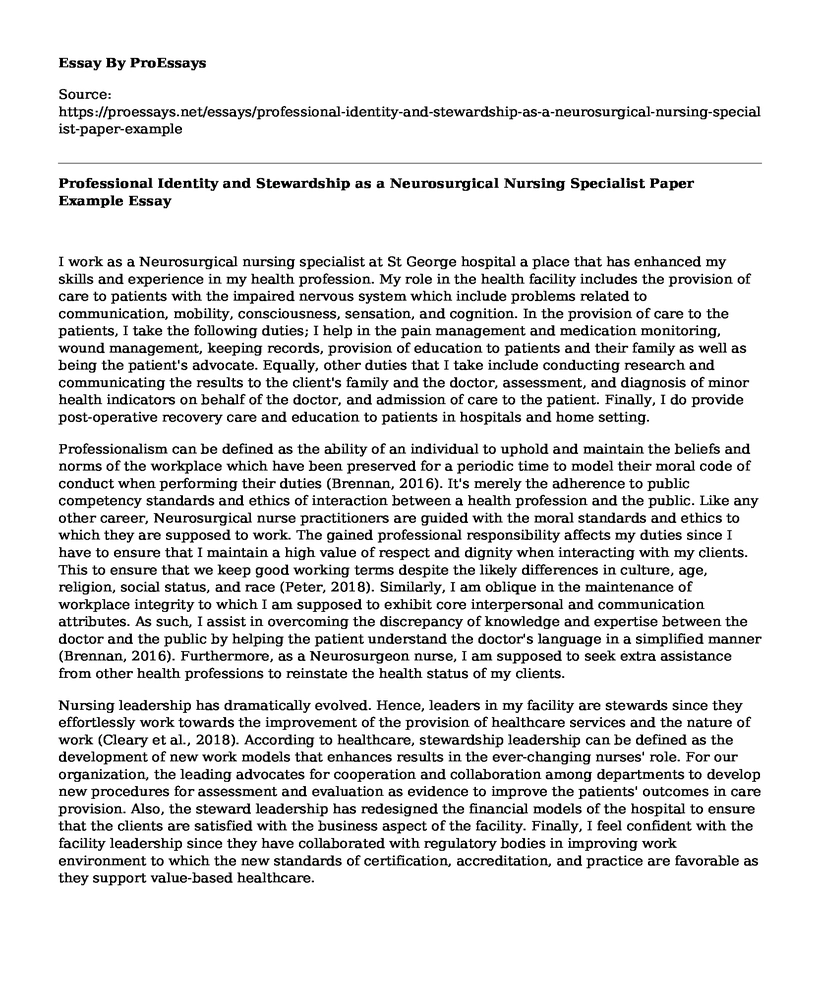I work as a Neurosurgical nursing specialist at St George hospital a place that has enhanced my skills and experience in my health profession. My role in the health facility includes the provision of care to patients with the impaired nervous system which include problems related to communication, mobility, consciousness, sensation, and cognition. In the provision of care to the patients, I take the following duties; I help in the pain management and medication monitoring, wound management, keeping records, provision of education to patients and their family as well as being the patient's advocate. Equally, other duties that I take include conducting research and communicating the results to the client's family and the doctor, assessment, and diagnosis of minor health indicators on behalf of the doctor, and admission of care to the patient. Finally, I do provide post-operative recovery care and education to patients in hospitals and home setting.
Professionalism can be defined as the ability of an individual to uphold and maintain the beliefs and norms of the workplace which have been preserved for a periodic time to model their moral code of conduct when performing their duties (Brennan, 2016). It's merely the adherence to public competency standards and ethics of interaction between a health profession and the public. Like any other career, Neurosurgical nurse practitioners are guided with the moral standards and ethics to which they are supposed to work. The gained professional responsibility affects my duties since I have to ensure that I maintain a high value of respect and dignity when interacting with my clients. This to ensure that we keep good working terms despite the likely differences in culture, age, religion, social status, and race (Peter, 2018). Similarly, I am oblique in the maintenance of workplace integrity to which I am supposed to exhibit core interpersonal and communication attributes. As such, I assist in overcoming the discrepancy of knowledge and expertise between the doctor and the public by helping the patient understand the doctor's language in a simplified manner (Brennan, 2016). Furthermore, as a Neurosurgeon nurse, I am supposed to seek extra assistance from other health professions to reinstate the health status of my clients.
Nursing leadership has dramatically evolved. Hence, leaders in my facility are stewards since they effortlessly work towards the improvement of the provision of healthcare services and the nature of work (Cleary et al., 2018). According to healthcare, stewardship leadership can be defined as the development of new work models that enhances results in the ever-changing nurses' role. For our organization, the leading advocates for cooperation and collaboration among departments to develop new procedures for assessment and evaluation as evidence to improve the patients' outcomes in care provision. Also, the steward leadership has redesigned the financial models of the hospital to ensure that the clients are satisfied with the business aspect of the facility. Finally, I feel confident with the facility leadership since they have collaborated with regulatory bodies in improving work environment to which the new standards of certification, accreditation, and practice are favorable as they support value-based healthcare.
Conclusion
Professional advocacy, authenticity, power, and influence are cumulative vital attributes of a leader in propelling its team towards working to the best performance. A leader should influence the colleagues rather than having absolute control over them. In return, workers tend to respect orders and obey authentic leaders more (Garrett, 2017). Equally, a leader should be a servant of its people but with the power to direct them. Therefore, a good leader should have authenticity and ability to steer its team to a shared goal while putting concern on their opinions.
References
Brennan, M. (2016). The role of professionalism in clinical practice, medical education, biomedical research and health care administration. Journal Of Translational Internal Medicine, 4(2), 64-65. doi: 10.1515/jtim-2016-0017
Cleary, S., Toit, A., Scott, V., & Gilson, L. (2018). Enabling relational leadership in primary healthcare settings: lessons from the DIALHS collaboration. Health Policy And Planning, 33(suppl_2), ii65-ii74. doi: 10.1093/heapol/czx135
Garrett, H. (2017). Authentic Leadership in Nursing. Retrieved from http://rn-journal.com/journal-of-nursing/authentic-leadership-in-nursing
Peter, E. (2018). Overview and Summary: Ethics in Healthcare: Nurses Respond. The Online Journal Of Issues In Nursing, 23(1). doi: 10.3912/OJIN.Vol23No01ManOS
Cite this page
Professional Identity and Stewardship as a Neurosurgical Nursing Specialist Paper Example. (2022, Nov 28). Retrieved from https://proessays.net/essays/professional-identity-and-stewardship-as-a-neurosurgical-nursing-specialist-paper-example
If you are the original author of this essay and no longer wish to have it published on the ProEssays website, please click below to request its removal:
- Essay on the Collapse of Kutai Kartanegara Bridge
- The ANA Code of Ethics: How Do You Incorporate This Into Your Practice?
- Essay Sample on Perception of Caring in Nursing
- How Epilepsy Effects Athletics - Essay Sample
- Finger Worth $2 Billion Essay Example
- Alzheimer's: Memory Loss, Dementia & Brain Cell Death - Research Paper
- Living with Heart Failure: Pathophysiology and Treatment - Essay Sample







